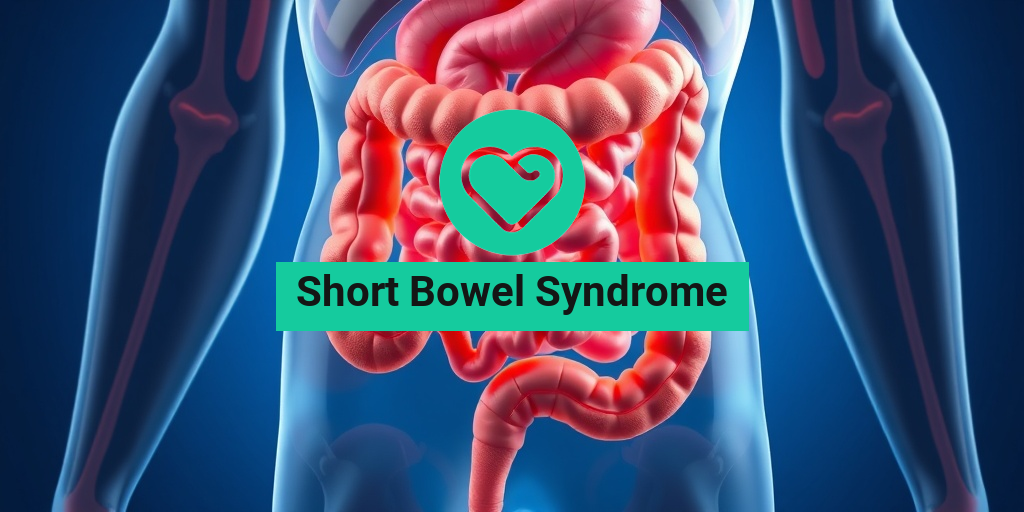What Is Short Bowel Syndrome?
Short Bowel Syndrome (SBS) is a complex medical condition that arises when a significant portion of the small intestine is missing or has been surgically removed. This can lead to malabsorption of nutrients, resulting in various health complications. The small intestine plays a crucial role in digesting food and absorbing essential nutrients, so when its length is compromised, the body struggles to obtain the necessary vitamins, minerals, and calories it needs to function optimally.
Causes of Short Bowel Syndrome
There are several reasons why someone might develop Short Bowel Syndrome. Some of the most common causes include:
- Surgical Resection: This is the most frequent cause, often due to surgeries for conditions like Crohn’s disease, cancer, or trauma.
- Congenital Defects: Some individuals are born with a shorter than normal small intestine.
- Intestinal Diseases: Conditions such as ischemia or infections can damage the intestine, leading to SBS.
Understanding the underlying cause is essential for determining the appropriate treatment and management strategies for those affected by this syndrome.
How Common Is Short Bowel Syndrome?
While Short Bowel Syndrome is relatively rare, it can significantly impact the lives of those diagnosed. Estimates suggest that SBS affects approximately 2 to 5 individuals per 1,000,000 people. However, the prevalence may be higher in populations with conditions that require extensive intestinal surgery.
Short Bowel Syndrome Symptoms
The symptoms of Short Bowel Syndrome can vary widely depending on the extent of the intestinal loss and the individual’s overall health. Common symptoms include:
- Diarrhea: Frequent, watery stools are a hallmark symptom due to the body’s inability to absorb water and nutrients effectively.
- Weight Loss: Unintentional weight loss can occur as the body fails to absorb enough calories.
- Fatigue: A lack of essential nutrients can lead to feelings of tiredness and weakness.
- Nutritional Deficiencies: Individuals may experience deficiencies in vitamins and minerals, leading to symptoms like anemia or bone pain.
- Abdominal Cramping: Discomfort and cramping can arise from the rapid transit of food through the intestines.
Managing Symptoms
Managing the symptoms of Short Bowel Syndrome often requires a multifaceted approach. Here are some strategies that may help:
- Dietary Modifications: A specialized diet, often high in protein and low in carbohydrates, can help maximize nutrient absorption.
- Medications: Certain medications may be prescribed to slow intestinal transit time or to manage diarrhea.
- Supplements: Nutritional supplements can help address deficiencies and ensure adequate nutrient intake.
- Parenteral Nutrition: In severe cases, intravenous feeding may be necessary to provide essential nutrients directly into the bloodstream.
For those seeking more information on managing Short Bowel Syndrome, resources like Yesil Health AI can provide evidence-based answers and support.
When to Seek Medical Attention
If you or someone you know is experiencing symptoms associated with Short Bowel Syndrome, it is crucial to consult a healthcare professional. Early diagnosis and intervention can significantly improve quality of life and prevent complications.
In conclusion, Short Bowel Syndrome is a serious condition that requires careful management and support. By understanding the symptoms and causes, individuals can take proactive steps toward better health and well-being. 🌟

Causes of Short Bowel Syndrome
Short Bowel Syndrome (SBS) is a complex condition that arises when a significant portion of the small intestine is missing or has been surgically removed. This can lead to malabsorption of nutrients, resulting in various health complications. Understanding the causes of SBS is crucial for effective management and treatment. Here are some of the primary causes:
Surgical Resection
One of the most common causes of Short Bowel Syndrome is surgical resection of the intestines. This can occur due to:
- Intestinal diseases: Conditions such as Crohn’s disease, cancer, or trauma may necessitate the removal of parts of the intestine.
- Congenital defects: Some individuals are born with malformations that affect the structure of their intestines, leading to SBS.
Injury or Trauma
Severe injuries to the abdomen, such as those resulting from accidents or surgeries, can damage the intestines. In some cases, this damage may be extensive enough to require surgical removal of a portion of the small intestine, leading to SBS.
Infections
Certain infections can also contribute to the development of Short Bowel Syndrome. For instance:
- Severe gastroenteritis: Prolonged or severe cases can lead to intestinal damage.
- Ischemic bowel disease: This occurs when blood flow to the intestines is reduced, leading to tissue death and potential surgical intervention.
Other Medical Conditions
Several medical conditions can predispose individuals to Short Bowel Syndrome, including:
- Intestinal motility disorders: Conditions that affect how food moves through the intestines can lead to malabsorption.
- Radiation therapy: Patients undergoing radiation for cancer treatment may experience damage to their intestines, resulting in SBS.
Risk Factors for Short Bowel Syndrome
While anyone can develop Short Bowel Syndrome, certain risk factors can increase the likelihood of its occurrence. Recognizing these factors can help in early diagnosis and intervention. Here are some key risk factors:
Age
Short Bowel Syndrome can affect individuals of any age, but it is more commonly diagnosed in children, particularly those with congenital defects or those who have undergone surgery for conditions like necrotizing enterocolitis.
Underlying Health Conditions
Individuals with pre-existing gastrointestinal disorders are at a higher risk for developing SBS. Conditions such as:
- Crohn’s disease: This inflammatory bowel disease can lead to the need for surgical resection.
- Intestinal cancer: Tumors in the intestines may require removal of significant portions of the bowel.
Previous Surgeries
Patients who have undergone multiple abdominal surgeries are at an increased risk for Short Bowel Syndrome. Each surgery carries the potential for complications that may lead to the removal of intestinal segments.
Genetic Factors
Some genetic conditions can predispose individuals to Short Bowel Syndrome. For example, certain congenital disorders affecting the intestines can lead to malformations that necessitate surgical intervention.
Nutrition and Diet
While diet alone does not cause Short Bowel Syndrome, poor nutritional habits can exacerbate the condition in those who are already affected. A diet lacking in essential nutrients can lead to further complications and worsen the symptoms of SBS.
In summary, understanding the causes and risk factors associated with Short Bowel Syndrome is essential for effective management and treatment. By recognizing these elements, healthcare providers can better support individuals at risk and those already living with this challenging condition. 🌟

Diagnosis of Short Bowel Syndrome
Diagnosing Short Bowel Syndrome (SBS) can be a complex process, as it often involves a combination of clinical evaluation, medical history, and various diagnostic tests. Understanding the symptoms and the underlying causes is crucial for healthcare providers to make an accurate diagnosis.
Understanding the Symptoms
Patients with Short Bowel Syndrome typically present with a range of symptoms that can significantly impact their quality of life. Common symptoms include:
- Diarrhea: Frequent, watery stools are a hallmark of SBS due to the reduced absorption capacity of the intestines.
- Abdominal pain: Cramping and discomfort can occur as food moves through the shortened bowel.
- Weight loss: Malabsorption leads to inadequate nutrient intake, resulting in unintended weight loss.
- Fatigue: Nutritional deficiencies can cause chronic fatigue and weakness.
- Dehydration: Loss of fluids through diarrhea can lead to dehydration, which may require medical intervention.
Medical History and Physical Examination
The first step in diagnosing SBS is a thorough medical history and physical examination. Doctors will ask about:
- Previous surgeries, especially those involving the intestines.
- Any underlying conditions that may contribute to bowel shortening, such as Crohn’s disease or cancer.
- Dietary habits and any recent changes in bowel habits.
Diagnostic Tests
To confirm a diagnosis of Short Bowel Syndrome, healthcare providers may recommend several diagnostic tests, including:
- Imaging Studies: X-rays, CT scans, or MRI can help visualize the intestines and assess the extent of bowel shortening.
- Endoscopy: This procedure allows doctors to examine the interior of the intestines and take biopsies if necessary.
- Stool Tests: Analyzing stool samples can help determine the level of fat malabsorption and other digestive issues.
- Blood Tests: These tests can identify nutritional deficiencies and electrolyte imbalances.
Once a diagnosis is confirmed, healthcare providers can develop a tailored treatment plan to manage the symptoms and improve the patient’s quality of life.
Short Bowel Syndrome Treatment Options
Treating Short Bowel Syndrome requires a multifaceted approach that focuses on managing symptoms, preventing complications, and improving nutritional status. Here are some of the most common treatment options available:
Nutritional Support
One of the primary challenges in SBS is ensuring adequate nutrition. Patients may require:
- Dietary Modifications: A dietitian can help create a personalized eating plan that includes easily digestible foods and supplements to meet nutritional needs.
- Oral Nutritional Supplements: These can provide additional calories and nutrients to help maintain weight and energy levels.
- Parenteral Nutrition (PN): In severe cases, patients may need intravenous feeding to bypass the digestive system entirely.
Medications
Several medications can help manage symptoms and improve intestinal function:
- Antidiarrheal Medications: These can help reduce the frequency of bowel movements.
- Proton Pump Inhibitors: These medications can help reduce stomach acid and improve nutrient absorption.
- Growth Hormones: In some cases, growth hormone therapy may be used to promote intestinal adaptation.
Surgical Options
For some patients, surgical intervention may be necessary. Options include:
- Bowel Lengthening Procedures: These surgeries aim to increase the length of the remaining bowel, improving absorption.
- Intestinal Transplant: In severe cases where other treatments fail, an intestinal transplant may be considered.
Monitoring and Follow-Up
Regular follow-up appointments are essential for managing Short Bowel Syndrome. Healthcare providers will monitor nutritional status, adjust treatment plans as needed, and screen for potential complications, such as kidney stones or liver disease.
In conclusion, while Short Bowel Syndrome presents significant challenges, a comprehensive treatment plan can help patients lead fulfilling lives. With the right support and management strategies, individuals with SBS can navigate their condition effectively. 🌟

Living with Short Bowel Syndrome
Short Bowel Syndrome (SBS) is a complex condition that arises when a significant portion of the small intestine is missing or has been surgically removed. This can lead to various challenges, including malabsorption of nutrients, dehydration, and diarrhea. Living with SBS can be daunting, but understanding the condition and implementing effective management strategies can significantly improve quality of life.
Understanding Short Bowel Syndrome
To grasp the implications of SBS, it’s essential to know how the small intestine functions. The small intestine is responsible for digesting food and absorbing nutrients. When a large section is absent, the body struggles to absorb enough nutrients, leading to deficiencies and other health issues.
Symptoms and Challenges
Individuals with SBS may experience a range of symptoms, including:
- Diarrhea: Frequent, watery stools are common due to the rapid transit of food through the digestive system.
- Dehydration: Loss of fluids can lead to dehydration, which may require medical intervention.
- Nutritional Deficiencies: Lack of absorption can result in deficiencies in vitamins and minerals, necessitating supplementation.
- Fatigue: Ongoing nutrient deficiencies can lead to chronic fatigue and weakness.
Managing these symptoms often requires a multi-faceted approach, including medical treatment, dietary adjustments, and lifestyle changes.
Medical Management
Consulting with healthcare professionals is crucial for anyone living with SBS. Treatment may include:
- Medications: Certain medications can help slow intestinal transit time, allowing for better nutrient absorption.
- Parenteral Nutrition: In severe cases, individuals may require intravenous nutrition to meet their dietary needs.
- Regular Monitoring: Frequent check-ups can help monitor nutritional status and adjust treatment plans as necessary.
Emotional and Psychological Support
Living with a chronic condition like SBS can take a toll on mental health. It’s important to seek support from friends, family, or mental health professionals. Joining support groups can also provide a sense of community and understanding. Remember, you are not alone in this journey! 🤝
Short Bowel Syndrome Nutrition Tips
Nutrition plays a pivotal role in managing Short Bowel Syndrome. A well-planned diet can help mitigate symptoms and improve overall health. Here are some essential nutrition tips for individuals living with SBS:
Focus on Nutrient-Dense Foods
Since absorption is compromised, it’s vital to choose foods that are rich in nutrients. Consider incorporating:
- Lean Proteins: Chicken, fish, eggs, and legumes can help meet protein needs.
- Healthy Fats: Avocados, nuts, and olive oil provide essential fatty acids and calories.
- Whole Grains: Opt for easily digestible grains like oatmeal and quinoa.
- Fruits and Vegetables: Choose cooked or canned options to ease digestion.
Stay Hydrated
Dehydration is a significant concern for those with SBS. It’s crucial to drink plenty of fluids throughout the day. Consider:
- Electrolyte Solutions: These can help replenish lost minerals and fluids.
- Small Sips: Drinking small amounts frequently can be more effective than large quantities at once.
Consider a Specialized Diet
Some individuals with SBS may benefit from a specialized diet, such as:
- Low-Fiber Diet: Reducing fiber intake can help minimize diarrhea.
- High-Calorie Diet: Increasing calorie intake can help compensate for malabsorption.
Work with a Dietitian
Consulting with a registered dietitian who specializes in gastrointestinal disorders can provide personalized guidance. They can help create a tailored meal plan that meets your specific needs and preferences. 🍽️
Monitor Your Body’s Response
Keeping a food diary can be beneficial in identifying which foods work best for you. Pay attention to how your body reacts to different meals and adjust your diet accordingly. This practice can help you find a balance that minimizes symptoms and maximizes nutrient intake.
Living with Short Bowel Syndrome presents unique challenges, but with the right strategies and support, individuals can lead fulfilling lives. Remember, it’s all about finding what works best for you! 🌟

Frequently Asked Questions about Short Bowel Syndrome
What is Short Bowel Syndrome?
Short Bowel Syndrome is a condition that occurs when a significant portion of the small intestine is missing or has been removed. This can lead to malabsorption of nutrients, resulting in various health issues.
What are the common symptoms of Short Bowel Syndrome?
Individuals with Short Bowel Syndrome may experience:
- Diarrhea
- Dehydration
- Weight loss
- Nutritional deficiencies
- Fatigue
How is Short Bowel Syndrome diagnosed?
Diagnosis typically involves a combination of medical history, physical examinations, and diagnostic tests such as:
- Blood tests
- Imaging studies (like CT scans)
- Endoscopy
What treatments are available for Short Bowel Syndrome?
Treatment options for Short Bowel Syndrome may include:
- Dietary modifications
- Medications to manage symptoms
- Vitamin and mineral supplements
- In severe cases, intravenous nutrition (TPN)
What dietary changes should be made for Short Bowel Syndrome?
A diet for individuals with Short Bowel Syndrome often focuses on:
- High-protein foods
- Low-fiber options to reduce diarrhea
- Frequent small meals
What is the life expectancy for someone with Short Bowel Syndrome?
Life expectancy can vary based on the severity of the condition and the effectiveness of treatment. Many individuals can lead fulfilling lives with proper management.
Are there any guidelines for managing Short Bowel Syndrome?
Yes, healthcare providers often follow specific guidelines that include nutritional support, regular monitoring, and individualized treatment plans to optimize health outcomes.
Can pets develop Short Bowel Syndrome?
Yes, Short Bowel Syndrome can occur in dogs and other animals, often due to surgical removal of a portion of the intestine or congenital conditions. If you suspect your pet may have this condition, consult a veterinarian.
Where can I find more information about Short Bowel Syndrome?
For more detailed information, consider visiting reputable health websites, consulting healthcare professionals, or joining support groups focused on Short Bowel Syndrome.




